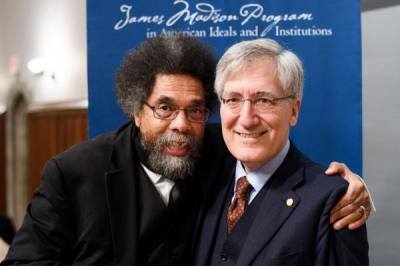 Robert P. George (R) and Cornel West (L) | fb/Owen Strachan
Robert P. George (R) and Cornel West (L) | fb/Owen StrachanIf requested, most of us would admit that we're fallible. but each person are occasionally tempted to behave, or suppose, that we're not. We wrap our emotions so tightly around our convictions that we turn into dogmatists — unwilling to be challenged, to genuinely accept as true with that we should be would becould very well be wrong about issues that are crucial to us.
but if we are going to get anyplace in existence, then we ought to be humble enough to be open to the possibility that we can be wrong about any variety of things. here is principally vital for these of us who are seeking for to be followers of Christ: our premier allegiance is to God and, as a consequence, to the truth.
I these days participated in Pepperdine institution's President's Speaker sequence with my respectable buddy and fellow truth-seeker, Cornel West, professor of the follow of public philosophy at Harvard tuition and professor emeritus at Princeton college. In our communicate "Honesty and courage, Humility and Hope," we discussed the habits of coronary heart and intellect — the virtues — which are required to engage in thoughtful and respectful dialog that explores diverse viewpoints.
What i like about Pepperdine is that it isn't simplest an intellectually severe, morally dedicated Christian school committed to following the teachings of Jesus Christ, but one this is open to exploration and talk with those of differing views inside the Christian community and outside of it. As an tutorial institution, Pepperdine has set an example for other associations, be they religiously affiliated or non-sectarian, to follow.
If we basically desire to pursue certainty, then we have to honestly appreciate our own fallibility. We have to be inclined to be made uncomfortable as a result of actuality-in quest of is rarely a snug assignment.
Free CP Newslettersbe part of over 250,000 others to get the accurate experiences curated each day, plus special presents!
Free CP Newslettersbe part of over 250,000 others to get the exact experiences curated daily, plus particular offers!
whatever we all know about ourselves is that we're incorrect about some issues. all of us hang some beliefs that don't seem to be true. And if we are sincere with ourselves, we will appreciate that among the many things we may well be wrong about are some critical, morally large things.
It's natural to wrap our feelings extra or less tightly around our convictions. And it's no longer a nasty component, in and of itself. in any case, we want some emotional investment as a way to make things happen, to get issues accomplished.
Yet, if we allow our feelings to get wrapped too tightly round our convictions, then we do become dogmatists. We lose the intellectual humility it's an critical precondition of the certainty-looking for commercial enterprise. And in a healthy culture, individuals may still be capable of muster the honesty and courage to speak reality to cultural, financial, and political vigor — and to face truth, and the need to embrace it ourselves, no count number how uncomfortable it makes us.
We need to have conversations with americans of different faiths and of no faith as a result of we have plenty to be trained from them. The best approach we are going to circulation in the direction of reality is with the aid of opening ourselves up to being challenged. We want the honesty and braveness, humility and hope required to communicate the truth and seek the reality, including painful truths that unsettle now not only these with whom we disagree, but also our friends and ourselves.
Free CP Newslettersbe a part of over 250,000 others to get the correct stories curated daily, plus special presents!
Free CP Newslettersbe a part of over 250,000 others to get the correct experiences curated day by day, plus special presents!
Robert George is the McCormick Professor of Jurisprudence and director of the James Madison software in American ideals and associations at Princeton tuition. He has served as chairman of the U.S. fee on international non secular Freedom and as a presidential appointee to the U.S. commission on Civil Rights. George has additionally served on the President's Council on Bioethics and because the American member of UNESCO's World commission on the Ethics of Science and technology. He turned into a judicial fellow on the Supreme courtroom of the U.S., where he got the Justice Tom C. Clark Award.
A Phi Beta Kappa graduate of Swarthmore school, George holds degrees from Harvard school and Oxford institution, moreover 22 honorary doctorates. he's a recipient of the U.S. Presidential residents Medal, the Honorific Medal for the defense of Human Rights of the Republic of Poland and is a member of the Council on international family members. His most fresh book is "conscience and Its Enemies: Confronting the Dogmas of Liberal Secularism."



No comments:
Post a Comment